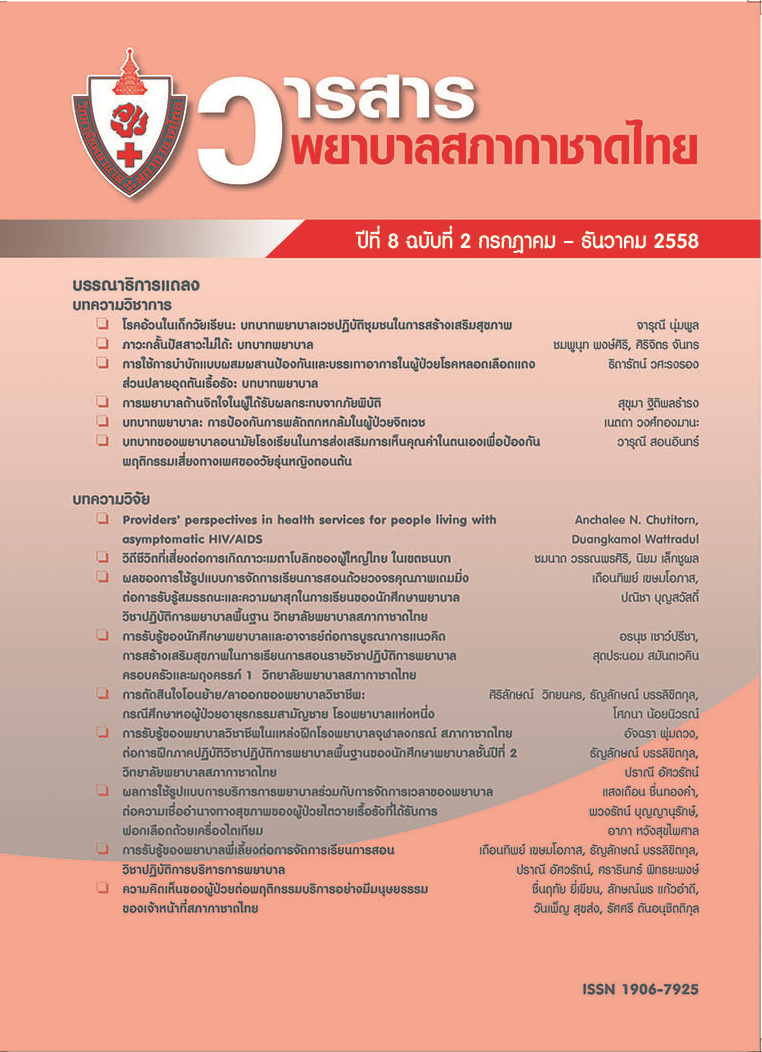ผลการใช้รูปแบบการบริการการพยาบาลร่วมกับการจัดการเวลาของพยาบาล ต่อความเชื่ออำนาจทางสุขภาพของผู้ป่วยไตวายเรื้อรัง ที่ได้รับการฟอกเลือดด้วยเครื่องไตเทียม
Keywords:
การจัดการเวลา, ความเชื่ออำนาจทางสุขภาพ, ไตวายเรื้อรัง, การฟอกเลือดด้วยไตเทียม, time management, health locus of control, chronic renal failure, hemodialysisAbstract
การวิจัยครั้งนี้เป็นการวิจัยกึ่งทดลอง มีวัตถุประสงค์ เพื่อศึกษาผลการใช้รูปแบบการบริการการพยาบาลร่วมกับการจัดการเวลาของพยาบาลต่อความเชื่ออำนาจทางสุขภาพของผู้ป่วยไตวายเรื้อรังที่ได้รับการฟอกเลือดด้วยเครื่องไตเทียม กลุ่มตัวอย่างคือผู้ป่วยที่ได้รับการฟอกเลือดด้วยเครื่องไตเทียม 20 ราย คัดเลือกแบบเฉพาะเจาะจงตามคุณสมบัติที่กำหนด แบ่งเป็นกลุ่มทดลองและกลุ่มควบคุมกลุ่มละ 10 ราย กลุ่มทดลองได้รับการปฏิบัติตามรูปแบบที่ประกอบด้วย 5 กิจกรรม 22 การปฏิบัติการพยาบาล โดยใช้แนวคิดการจัดสรรเวลาและปฏิบัติการพยาบาลตามแนวคิดการส่งเสริมสุขภาพของเพนเดอร์ ในช่วงเวลา 6 สัปดาห์ ส่วนกลุ่มควบคุมได้รับการพยาบาลแบบปกติ เก็บข้อมูลโดยใช้แบบสอบถามการรับรู้ความเชื่ออำนาจทางสุขภาพ วิเคราะห์ข้อมูลโดยการแจกแจงความถี่ ค่าเฉลี่ย ค่าเบี่ยงเบนมาตรฐาน และสถิติ Mann-Whitney U-test และ Wilcoxon signed ranks test
ผลการวิจัยพบว่า หลังการทดลองกลุ่มทดลองมีคะแนนเฉลี่ยการรับรู้ความเชื่ออำนาจทางสุขภาพสูงกว่ากลุ่มควบคุมทั้งโดยรวมและรายด้าน และคะแนนเฉลี่ยการรับรู้ความเชื่ออำนาจทางสุขภาพของกลุ่มทดลองหลังการทดลองสูงกว่าก่อนการทดลอง ทั้งโดยรวมและรายด้านอย่างมีนัยสำคัญทางสถิติที่ระดับ.01
ผลการวิจัยครั้งนี้ ชี้ให้เห็นว่า รูปแบบการบริการพยาบาลฯ ที่ผู้วิจัยสร้างขึ้นนี้ เป็นรูปแบบที่ผู้บริหารการพยาบาลและพยาบาล สามารถนำไปใช้ในการดูแลผู้ป่วยและส่งเสริมการรับรู้ความเชื่ออำนาจทางสุขภาพของผู้ป่วยไตวายเรื้อรังที่ได้รับการฟอกเลือดด้วยเครื่องไตเทียมได้
Effects of nursing intervention integrating the nursing time management concept on the heath locus of control among patient with hemodialysis
This quasi-experimental research was conducted to examine the effects of the nursing service model integrating nurse time management concept on the health locus of control as perceived by chronic renal failure patients with hemodialysis. A purposive sample of 20 chronic renal failure patients receiving hemodialysis were recruited in the study and assigned to either the experimental group (10 patients) or the control group (10 patients). The experimental group received the nursing service model developed by the researcher using the time management concept and nursing practice based on Pender’s health promotion model. The intervention comprised 5 main activities and 22 nursing actions for individual patients within 6 weeks. The control group received the usual care. The outcome variable was collected by the Health Locus of Control Questionnaire. Data were analyzed by frequency, means, standard deviation, Mann-Whitney U-test, and Wilcoxon signed ranks test.
The results of the study revealed that after the experiment, the mean scores overall and for each aspect of health locus of control in the experimental group were statistically significantly higher than those in the control group (p< .01). The mean scores overall and for each aspect of health locus of control after the experiment were higher than before in the experimental group (p< .01).
The results of this study supported the notion that the nursing service model in this study could be applied by administrators and nurses to provide care and improve the health locus of control among hemodialysis patients.
Downloads
Issue
Section
License
เนื้อหาบทความหรือข้อคิดเห็นต่างๆ ในวารสารพยาบาลสภากาชาดไทยนี้ เป็นความคิดเห็นของผู้เขียนบทความ ไม่ใช่ความเห็นของกองบรรณาธิการ หรือสถาบันการพยาบาลศรีสวรินทิรา สภากาชาดไทย






